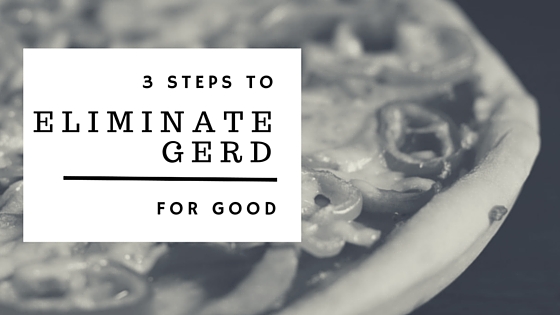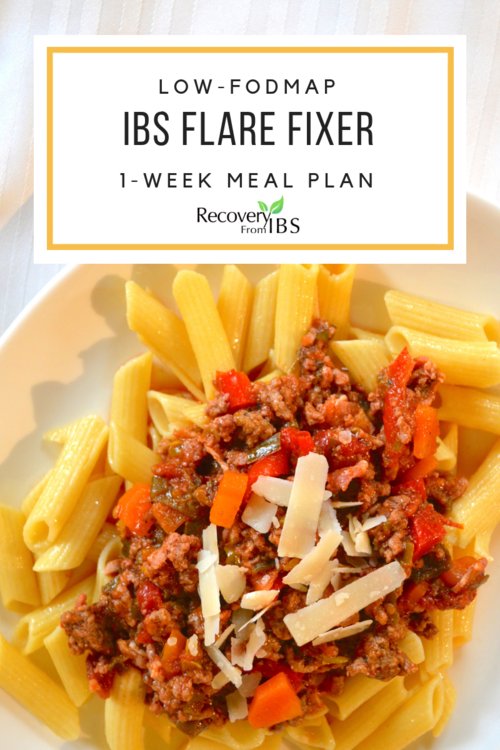How to Eliminate GERD for Good in Three Steps (a Registered Dietitian’s Protocol)

If you want to know how to eliminate GERD for good, you’ve come to the right place! As a functional medicine-trained Registered Dietitian, I’ve perfected my protocol across hundreds of patients across the year.
Just as some background, a vast number of people experience heart burn, also known as acid reflux. Studies show that approximately 60 million US adults experience symptoms at least once per week (1, 2). The more severe form of reflux, known as Gastroesophageal Reflux Disease (GERD) effects 10-20% of the western population (3, 4). Despite how common reflux is, shockingly few people know the true cause of it! For this reason, reflux remains a chronic condition for most people. Fortunately, most cases of reflux have a treatable cause, which I will explain in this article.
But first, let’s clarify what causes reflux and GERD. Usually, the acidic contents of the stomach is kept out of the esophagus by the lower-esophageal sphincter (LES). However, when stomach acid escapes through the LES and enters the esophagus, symptoms of reflux occur. These symptoms include heartburn (a burning sensation in the chest or abdomen), bad breath, nausea, swallowing problems, respiratory complications, esophagitis, Barrett’s Esophagus, esophageal stricture, and vomiting (5).
There are basically two common non-surgical treatments for GERD. One is to lower stomach acid using either over the counter or prescription medications. These medications either neutralize acid (antacids), block its release (H2 blockers), or prevent its production (proton pump inhibitors/PPIs). The second common treatment is to recommend avoidance of “trigger foods”. These are foods that either are acidic themselves or are gastric irritants. Unfortunately, this traditional dietary advice has actually been disproved in the literature. Studies have shown that:
- There is no difference in reflux symptoms between low and high-fat meals, and there is no rationale for recommending a low-fat diet for reflux (6, 7, 8)
- There is no clear connection between alcohol and GERD (9)
- Coffee, beer, tea, and wine are not significantly associated with GERD, but white bread and sweets (carbohydrates) are – read on to discovery why (10)
High-fat diets, alcohol (beer and wine), coffee are not significantly associated with GERD – but specific types of carbohydrates are. I will explain why!
The surgical intervention for GERD (fundoplication surgery) is to tighten the LES by suturing the top of the stomach around it. According to the Journal of the American Medical Association (JAMA), this surgery is invasive and usually does not completely eliminate symptoms or the need for medication (11).
And that’s it. The problem here is that these approaches simply aim to reduce symptoms. They aren’t really an answer to the question of how to eliminate GERD for good. None of these approaches address the underlying cause. For example, according to a recent editorial from Gastroenterology, treating GERD by decreasing stomach acid will never be ideal because acid secretion is not the cause (12). Because of this disconnect, it is not uncommon for people to go years, or even decades, suffering through reflux symptoms, avoiding numerous foods and using acid-lowering medications. Not only does this approach fail to fix the problem, but there are significant risks of prolonged stomach acid suppression (which I will discuss below).
Wouldn’t it be better if you could eliminate the cause of GERD and reflux, then live without medication or surgical intervention? In this article I will explain what the underlying cause of GERD is for most people, outline the major risks of suppressing stomach acid, and suggest a 3-step process for addressing acid reflux.
What’s Really Going on with GERD
As for the cause of GERD, the question is why the LES is opening and allowing stomach acid to enter the esophagus. When the LES opens, this is called a transient lower esophageal sphincter relaxation (TLESR). Studies have analyzed TLESRs in GERD patients using manometry, a technique of lowering a pressure-sensitive tube through the LES into the stomach. These manometry studies have found that GERD patients experience lower LES pressure (weaker contraction), more belching, and more pressure in the stomach (intragastric pressure) (13, 14).
Obesity and pregnancy are independent risk factors for reflux, which means the condition is caused solely by the increased abdominal pressure in those cases (15, 16). However, the rest of reflux sufferers experience it for a different reason. A common belief is that they have high stomach acid. This is unlikely, as the risk of GERD increases with age, but production of stomach acid decreases with age. Studies have found that approximately 30% of adults over age 60 have atrophic gastritis (stomach inflammation associated with low acid) (17). Another study found that 39.8% of women over age 80 suffer from achlorhydria, or no stomach acid (18). Thus, it is not increased stomach acid, but the escape of stomach acid into the esophagus that causes symptoms.
So, the question is what causes decreased lower LES pressure, more belching, and increased intragastric pressure in GERD patients. One possible explanation for these findings is that something is causing increased gas in the gastrointestinal (GI) tract, forcing the LES to open more often or more forcefully. If this were true, then surgical tightening of the LES (fundoplication surgery) would lead to increased pressure in the GI tract. In fact, research has shown fundoplication surgery to do just that – it increases symptoms of gas, flatulence, and bloating (19, 20). In other words, the gas has to go somewhere. If it can’t go up, then it goes down (flatulence) and/or out (bloating).
So, where could this gas be coming from? Well, one answer is an overgrowth of bacteria in the small intestine, known as small intestinal bacterial overgrowth (SIBO) (21). Intestinal bacteria are usually only majorly present in the large intestine but, in the case of SIBO, bacteria have migrated to the small intestine and thrived there (52). These bacteria derive most of their energy from carbohydrates and produce large volumes of gas (22). The incidence of SIBO has been measured using the glucose breath test at 5.9% among younger adults and 15.6% among older adults. (52). However, the glucose test is known to be fairly insensitive for SIBO and, thus, the incidence is likely even higher. With 20% of adults experiencing reflux symptoms, it’s entirely possible for the majority of them to have SIBO. A second possible contributor to excess intragastric pressure is gut dysbiosis. In this case, there are too large a proportion of gas-producing strains of bacteria.
The Evidence that Gut Bacteria Causes Reflux
So, what is the evidence that gut bacteria cause reflux? If SIBO or gut dysbiosis were truly the cause of reflux, then you would expect lower carbohydrate intake to decrease symptoms. This is because gut bacteria depend on carbohydrate (especially non-digestible fibers) for fuel (23). Sure enough, research has found that low-carbohydrate diets significantly improve reflux symptoms (24, 25). This fact explains why research has found carbohydrate intake to be significantly associated with GERD symptoms (10).
And there’s more. The standard treatment for SIBO is antibiotics targeting the overgrown intestinal bacteria. Interestingly, research has shown that antibiotics reduce reflux symptoms and esophageal acid exposure, and increase LES pressure (strength of contraction) (26, 27, 28). So, eliminating bacteria with antibiotics actually improves acid reflux. If bacteria were not the cause of acid reflux, you would not expect any effect of antibiotics. This evidence further suggests that gut bacteria is a significant underlying cause of acid reflux.
In other evidence of this, studies have shown that feeding intestinal bacteria worsens acid reflux symptoms. Prebiotics are fibers that are not digested and absorbed by the human GI tract, but that are metabolized by intestinal bacteria. Prebiotics are helpful for gut health if bacteria are in the correct location, but they worsen SIBO symptoms by feeding the small intestinal growth. A study looking at the prebiotic fiber fructooligosaccharide (FOS) found that GERD patients treated with FOS experienced an increased rate of TLESRs, a higher number of reflux episodes, and worsened GERD symptoms (29).
As final evidence of the SIBO – reflux connection, you would expect an increased rate of reflux in populations known to experience high rates of SIBO. In fact, this is the case. Cystic fibrosis patients have an increased rate both SIBO and reflux (30, 31, 32, 33). The reason for this is believed to be that they have a mucus blockage of the pancreatic duct. This duct usually releases the carbohydrate-digesting enzyme amylase. When carbohydrates can not be digested, they move further down the GI tract and reach bacteria which grow and thrive on it.
In another example, Irritable Bowel Syndrome (IBS) patients experience significantly higher rates of both SIBO and GERD (34 35, 36,37). Just like with acid reflux, treatment of IBS with low-carbohydrate diets and antibiotics is often successful (38, 39, 40, 41). This evidence shows again that reflux has a strong connection with gut bacteria.
I hope you now see the strong evidence that a common cause of acid reflux is SIBO. The natural question to then ask is what the cause of SIBO is. One cause can be low stomach acid. Yes, you read that right! Reflux sufferers are usually under the impression that their stomach acid is too high when, in fact, the opposite may be true. Low stomach acid can be caused by H. Pylori infection (a bacterial infection of the stomach), use of acid-lowering medications, or chronic stomach inflammation (chronic atrophic gastritis, CAG) (42, 43). The cause of CAG can be either a response to H.Pylori and/or acid-lowering medications, or it can be caused by an autoimmune attack of the parietal (acid-producing) cells of the stomach. Regardless of the cause, low stomach acid has been linked to increase risk of SIBO. Therefore, one important step for acid reflux sufferers is to determine if they have low stomach acid and, if so, to address it.
There are several other conditions associated with SIBO that should also be considered. These include:
- Impaired gastric motility
- Lack of pancreatic digestive enzymes (amylase to break down carbohydrate for digestion)
- Celiac Disease
- Irritable Bowel Syndrome (IBS)
- Irritable Bowel Disease (IBD) – Crohn’s and Ulcerative Colitis.
Therefore, the major question with acid reflux is whether SIBO and/or gut dysbiosis are present. In the case of SIBO, low stomach acid should be investigated as a possible underlying cause. If stomach acid is normal, then other possible causes should be investigated.
The major question with acid reflux is whether SIBO and/or gut dysbiosis are present.
The vicious cycle of GERD
Whether or not acid reflux starts with SIBO, the unfortunate truth is that standard reflux treatments can increase SIBO risk. As discussed previously, reflux and GERD are often treated with stomach acid-lowering medications. Of these, proton pump inhibitors (PPIs) have the strongest acid-lowering effect. Remember that low stomach acid is linked to increased risk of SIBO. There is a strong body of evidence connecting stomach acid-lowering PPIs with SIBO:
- A 2013 meta analysis scrutinized all literature on the connection between PPI use and SIBO. It found that there IS a significant connection between PPI use and SIBO, but only when the gold standard SIBO tests are used (duodenal or jujenal aspirate cultures) (44).
- A clinical trail found that when Prilosec (a PPI) was given to 30 GERD patients for three months, 11 of them developed SIBO, while only 1 out of 10 controls developed it (45).
- In another clinical trail, when GERD patients were treated with a PPI for 6 months, 26% developed SIBO and a statistically significant number of them developed IBS (51).
Thus, a vicious cycle exists here. Gut dysbiosis and SIBO can lead to GERD, and treatment of GERD by lowering stomach acid can lead to SIBO. This cycle is part of the reason why patients often remain on these medications indefinitely. The problem with this, aside from ongoing suffering from GERD, is that low stomach acid poses other significant health risks. These include:
- Decreased nutrient absorption (iron, B-12, zinc, folate, and calcium) (46)
- Impaired digestion (47)
- Decreased resistance to infection (i.e. pneumonia) (48 49)
- Increased risk of gastric cancer (50)
Thus, ongoing stomach acid suppression is by no means harmless. Fortunately, there is a way to break the vicious cycle, wean off acid-lowering medication, re-build gut health.
3 Steps to Eliminate GERD for Good!
As outlined above, traditional surgical and pharmacological approaches to GERD are ineffective and even harmful. Fortunately, there are safe, effective ways to reduce or even eliminate reflux symptoms for most people. These methods do not address the independent risk factors of obesity and pregnancy, but are otherwise effective. The three steps are:
1. Get Tested – Work with a medical provider to test for low stomach acid, nutrient deficiencies, SIBO, and gut dysbiosis. You may be able to accomplish these tests with either a gastroenterologist or a functional medicine doctor.
2. Eliminate the cause of your symptoms using a functional approach – Aim to eliminate SIBO if present, normalize stomach acid, and wean off acid-lowering medication. In addition to your physician,find a functional nutritionist who can help you through this process in a variety of ways:
- Use natural anti-microbial interventions to eliminate SIBO bacteria (note: alternatively, your physician may prescribe antibiotics that specifically target SIBO bacteria)
- Guide you through the various dietary interventions used to treat SIBO (low-carbohydrate, low-FODMAP, Specific Carbohydrate Diet, GAPS diet, or elemental formula)
- Recommend digestive enzymes to improve break-down and absorption of protein and nutrients, which is compromised when stomach acid is low
- Provide options for natural remedies to increase stomach acid
3. Restore healthy gut function – prevent re-occurrence by improving digestion and absorption and by restoring beneficial bacteria. Your functional nutritionist can work with you to find the best functional foods, prebiotics, probiotics, and remedies to restore healthy gut bacteria and mucosal lining. Enjoy your reflux-free life!
Conclusion
Many GERD sufferers are under the impression that medication, food avoidance, and possibly even surgery are their only treatment options. Unfortunately, these treatments fail to address the underlying reason for increased gastric pressure and leaking of stomach contents into the esophagus. Lowering of stomach acid is also not benign – it increases risk of nutrient deficiencies, infection, poor digestion, and gastric cancer. Lowering stomach acid can also worsen SIBO and gut dysbiosis, creating a vicious cycle that makes weaning from medication impossible.
Fortunately, there are ways to get tested, address SIBO and gut dysbiosis, and to restore gut health. These are the true steps for how to eliminate GERD and reflux. Working with a team of professionals to accomplish this is the best approach. I hope this article has given hope and ‘food for thought’ if you suffer from GERD. You don’t have to live with symptoms and medication forever. Please feel free to contact me with questions, or share them below in the comments!
Bonus!
Also, don’t miss my free low FODMAP meal plan! It dramatically reduces food for reflux-causing bacteria:
Don’t miss my FREE one-week meal plan! It’s low-FODMAP, nutrient-dense, easy, and delicious!
It’s your ticket to try Low-FODMAP (done right) without having to figure it all out first.
It reduces GERD by starving the gas-producing bacteria in your GI tract!
Gimmie the Free GERD-Reducing Meal Plan!
Best wishes,
Erin Skinner, MS, RD, IFNCP
Integrative and Functional Registered Dietitian Nutritionist

P.S. Please don’t forget to reach out HERE to request a free chat to discuss how I can help with your digestive healing journey.

